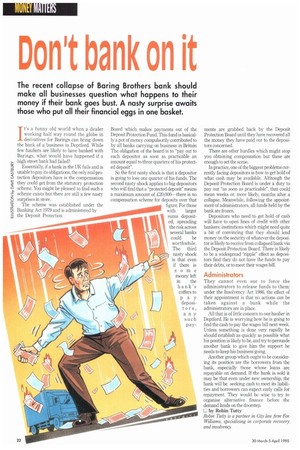Don's bank on it
Page 24

If you've noticed an error in this article please click here to report it so we can fix it.
It's a funny old world when a dealer working half way round the globe in derivatives for Barings can bring down the bank of a business in Deptford. While few hauliers are likely to have banked with Barings, what would have happened if a high street bank had failed?
Essentially, if a bank in the UK fails and is unable to pay its obligations, the only real protection depositors have is the compensation they could get from the statutory protection scheme. You might be pleased to find such a scheme exists but there are still a few nasty surprises in store.
The scheme was established under the Banking Act 1979 and is administered by the Deposit Protection Board which makes payments out of the Deposit Protection Fund. This fund is basically a pot of money compulsorily contributed to by all banks carrying on business in Britain The obligation of the board is to "pay out to each depositor as soon as practicable an amount equal to three quarters of his protected deposit".
So the first nasty shock is that a depositor is going to lose one quarter of his funds. The second nasty shock applies to big depositors who will find that a "protected deposit" means a maximum amount of £20,000—there is no compensation scheme for deposits over that figure. For those with larger sums deposited, spreading the risk across several banks could be worthwhile. The third nasty shock is that even if there is some money left
in the bank's coffers to pay depositors, any such pay ay ments
ments are grabbed back by the Deposit Protection Board until they have recovered all the money they have paid out to the depositors concerned.
There are other hurdles which might stop you obtaining compensation but these are enough to set the scene.
In practice, one of the biggest problems currently facing depositors is how to get hold of what cash may be available. Although the Deposit Protection Board is under a duty to pay out "as soon as practicable", that could mean weeks or, more likely, months after a collapse. Meanwhile, following the appointment of administrators, all funds held by the bank are frozen.
Depositors who need to get hold of cash will have to open lines of credit with other bankers: institutions which might need quite a bit of convincing that they should lend money on the security of whatever the depositor is likely to receive from collapsed bank via the Deposit Protection Board. There is likely to be a widespread "ripple" effect as depositors find they do not have the funds to pay their debts, or to meet their wages bill.
Administrators
They cannot even sue to force the administrators to release funds to them: under the Insolvency Act 1986, the effect of their appointment is that no actions can be taken against a bank while the administrators are in place.
All that is of little concern to our haulier in Deptford. He is worrying how he is going to find the cash to pay the wages bill next week. Unless something is done very rapidly he should establish as quickly as possible what his position is likely to be, and try to persuade another bank to give him the support he needs to keep his business going.
Another group which ought to be considering its position are the borrowers from the bank, especially those whose loans are repayable on demand. If the bank is sold it may be that even under new ownership, the bank will be seeking cash to meet its liabilities and borrowers can expect early calls for repayment. They would be wise to try to organise alternative finance before the demand lands on the doorstep.
ID by Robin Tutty Robin Tully is a partner in City law firm Fax Williams, specialising in corporate recovery and insolvency.
































































































